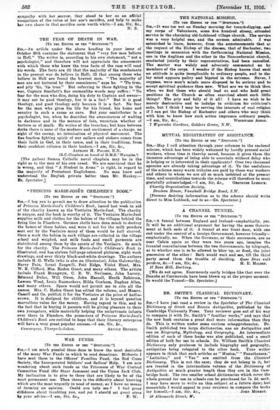THE FEAR OF DEATH IN WAR.
[To THE EDITOR Or THE " SPECTETOR.'1
Ern,—An article under the above heading in your issue of October 28th contains the statement that "very few men believe in Hell." The writer is, according to his own statement, " not a psychologist," and therefore will not appreciate the amazement with which those who know the true facts of the case will read his words. The facts are (1) that the majority of the combatants in the present war do believe in Hell; (2) that among those who believe in Hell are found the bravest men. " The majority of men are not tortured by their consciences," says he. " 'Tis true, and pity 'tis, 'tis true." But referring to those fighting in the war, Captain Smollett's fine seamanlike words may suffice: "No fear for the man who dies, doing his duty to Captain and owner— it may not be good theology, but it is a fact." But it is good theology, and good theology only because it is a fact. No fear for the man who gives his life for his friend, his home and country in such a cause as ours. But your contributor is a psychologist, too, when he describes the awesomeness of waiting in darkness and in the menace of fate, uncertain whether of torture or of death. He writes of the trenches; but here between decks there is none of the madness and excitement of a charge, no sight of the enemy, no intoxication of physical movement. The fine fearless fighting spirit of our sailors and stokers comes from their faith in God, in their cause, and in their traditions, from their confident reliance in their leaders.—I am, Sir, Ste., ANTHONY H. POLLEN, R.N.
(B.C. Chaplain on board of H.M.S.' Warspite.')
[The gallant Roman Catholic naval chaplain may be in the right as to the men of his own creed. We are convinced that he is wrong, and that "A Student in Arms" is right, in regard to the majority of Protestant Englishmen. No man knew and understood the English private better than Mr. Hankey.— ED. Spectator.]


































 Previous page
Previous page